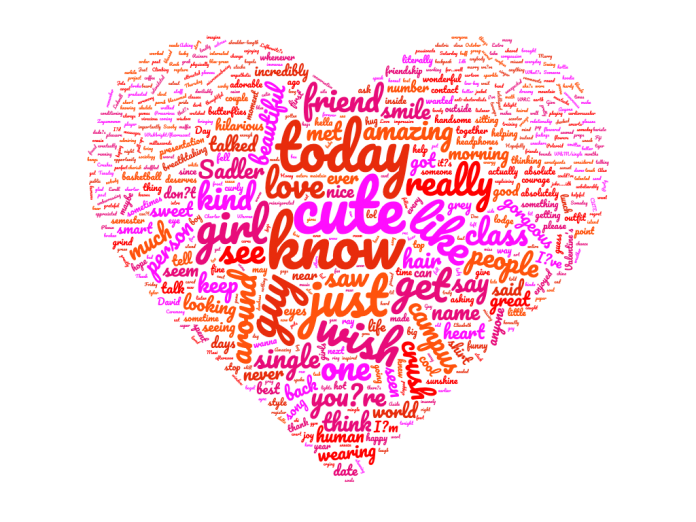Since spring 2019, hopeless romantics at the College of William and Mary have found solace in “william & mary crushes 3.0,” a Facebook group created solely to publish anonymous crushes and missed connections around campus. With over 2,000 followers, “crushes” is now a fixture of College kitsch, and it has quickly become a premier campus-specific social media page.
According to Gavin Meister ‘21, one of the four moderators on “crushes,” the page is designed to foster cute and meaningful interactions between students, especially those who see each other around campus without ever actually formally meeting — referred to in “crushes” lingo as missed connections.
Meister said that roughly five to 10 crushes are published each day and indicated that the frequency of crush submissions is so high that moderators have to schedule them several weeks in advance. As of late February, Meister and his fellow moderators have already scheduled most submitted crushes to be posted through March, creating a substantial backlog of miscellaneous notes.
While it is obvious that “crushes” occupies an important place on a campus full of shy, awkward twamps, my conversation with Meister sparked curiosity: among the dizzying dozens of crushes appearing on our newsfeeds, what themes are most common? Are crushes primarily submitted by individuals interested in romantic or platonic relationships with their unrequited love? What locations around the College are most likely to be hotspots for missed connections? Most of all, what traits and attributes are most frequently mentioned when students confess their affections?
Using the 80 most recent crushes posted on the page as of Feb. 21, I created a word cloud to visualize the most commonly used phrases and words employed to describe long-lost crushes and connections in Williamsburg. I omitted names and personally identifiable information, which were common denominations among many crush submissions.
The three words battling for supremacy include “know,” “today” and “cute.” I was wholly unsurprised by their frequency, since it seems that almost every other post that pops up on my newsfeed is some variant of “Does anyone know the cutie in [insert location] today?”
Looking beyond the top few most common words, I became increasingly intrigued by the generated word cloud’s results. A disappointing finding was our campus’s lack of diverse syntax. Most of the positive adjectives used to describe crushes are trite, pithy words that seem more at home in a fifth grader’s essay about what they did over the summer. Words like “amazing”, “sweet” and “beautiful” are so painfully cliché that their inclusion on the “crushes” page undermines their appeal.
Another particularly interesting find: of the dozens of academic buildings, residence halls and random spots around the College, only “Sadler” jumps out as a prominent reference on the submissions I examined. There must be something about the dining hall that brings out the friskier side of people, or at least something about the dark side of Center Court since the favorable lighting there occludes even the most unattractive of bodily flaws.
It is also clear from the word cloud that students at the College are a dramatic bunch, due to our thorough enjoyment of superlatives like “really” and “best.” I know I am guilty of this, having submitted crushes on a fair share of my friends with approximately eight superlatives describing them in each post, but seeing it thrown in my face here makes me somewhat concerned that we are too easily enamored.
Most depressing, though, is the size of the word “wish” in the word cloud. It makes sense that in an anonymous crushes page that many people would be forlorn about their missed opportunities to meet the individual of their dreams; the whole purpose of “crushes” is to cast loneliness out into the void in hopes of finding reciprocal affection. But in the busy and chaotic world of a college student, it is discomforting that so many people are letting love, platonic and romantic, pass them by, only to post longingly about it on social media. As a hopeless romantic, I see “crushes” as a true fixture of campus since it seeks to replace those sad, isolated moments with joyous ones — and that is something worth supporting.
Meister echoed these sentiments at our meeting, and regardless of content, he said that “crushes” will be here for time to come.
“Keep having crushes,” Meister said. “Not only so we don’t run out of things to post, but because it’s good to have things to think about and look forward to, crushes, in general, make us move towards something in some way.”

